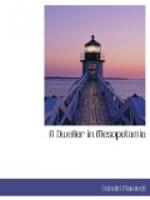The future of Mesopotamia with its enormous productive potentialities is a subject fraught with great interest to all those who have studied her past. Will this country again become one of the granaries of the world, and will it ever be, like Egypt, an important asset of our Empire? At first, when the war had freed the country from the Turkish yoke, it was assumed that it would rise into unheard-of prosperity under the fatherly care of British protection. Schemes of irrigation, long planned and to some small extent begun, even under the Turkish regime, were to re-stock Eden and benefit the whole world. The Baghdad railway would bring the wares of the East quickly to our doors, and it had even been anticipated that Nineveh would become as much a resort for European tourists as Rome.
All this, however, was foretold in the time when a new world was expected as soon as hostilities ceased. Another tune has been called now, and we find countless advocates of the policy to get out of Mesopotamia altogether and let well alone. Capitalization, like charity, we are told must begin at home, and thirty millions, estimated by the Inspector of Irrigation in Egypt, as necessary to turn Mesopotamia into a prosperous country with an annual revenue in fifty years time of ten millions a year, should be used for house building in England and not for empire building in Chaldea. On the other hand, wise men have told us that the Mesopotamian oilfields near Mosul are to be of great importance, like the Persian wells that have their pipe-line outfall at Abadan, and that a firm and fatherly hand is necessary to keep the country in a state of trade development. Should our sphere of influence be withdrawn from Mesopotamia things will revert back to chaos. Already trouble with the various tribes is brewing.
Not the least of the problems in controlling the marauding activities of some of the nomadic tribes is the difficulty of meting out adequate punishment to peace-breakers. The fact that all the stock-in-trade of a township amounts to a few pots and pans and house material of cane matting and mud makes it impossible to impress them by destroying their houses. In a few days everything would be rebuilt as before. It could often happen that the punitive expedition arrived to find the town moved to some district not mentioned in the orders for the day.
[Illustration: A BRITISH CRUISER IN THE PERSIAN GULF]
Mesopotamia under the Turks was in some ways worse off than others of his badly governed possessions. The officials who were sent from Constantinople into various provinces regarded the job as a poor one, as far as the amenities of life were concerned, and one to be endured while making as big a pile as possible from the ground-down natives. I should imagine that one of these officials would be about as popular with the landowners as a publican was among the Jews.




